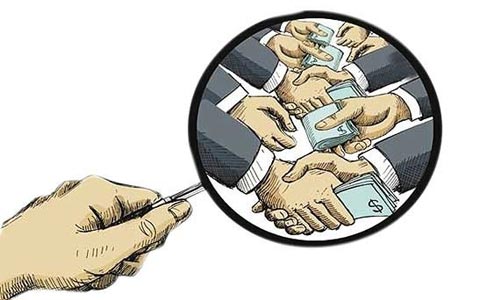Transparency International has published the Corruption Perception Index (CPI), which ranks 180 countries on a scale from 0 to 100 based their level of public sector corruption, annually since 1995. According to this year’s index, the average score was 43 and more than two-thirds of countries scored below 50. In general, developing countries with a weak democratic foundation and those struggling with modernization and democratization rank among the most corrupt nations. This continuous failure to control corruption itself can contribute to a crisis in democracy around the world. This year, Afghanistan with 16 points out of 100 and ranking of 172 out of 180 is among the most corrupt countries that hasn’t had significant improvement since 2005.
Afghanistan has been grappling with corruption since the establishment of the Afghan Interim Administration under the leadership of Hamid Karzai in 2001. While 2001-2005 were the years when Afghanistan received the bulk of the international community’s financial aid, the CPI annual report didn’t include Afghanistan until 2005. Looking into Afghanistan’s CPI ranking from 2005 to 20018, the country has been always listed among the most corrupt countries. This is a clear indication of meager improvements, despite that, in 2014, the new government specifically promised to root out corruption.
In the case of Afghanistan, the fragility of the new government, weak enforcement of law, and international financial assistance, which opened the doors for new sources of wealth, also promoted corruption in the country. Furthermore, after the collapse of Taliban regime in 2001, the international community pressured Afghanistan to incorporate new norms and values that challenged traditional Afghani society, where people cannot say “No” to their elders or loved ones. This doesn’t imply that people in collective societies are corrupt; every society will go through the same phase in the early phase of democracy until people adapt to the new system. The adaption to democratic norms starts when the political institutions have strong law enforcement which will not only prevent people from committing anything that contradicts with the law, but with the passage of time, it will evolve as a cultural norm among people.
Instances such as the Kabul bank crisis, the Aino Meena housing project, and the failure of the Anti-Corruption Program of current government show that, not only does the Afghan government fail to fight corruption, but that, in most cases, people in high-level positions themselves don’t have an interest in stopping corruption. In most of the cases, people assigned to high-level government positions know that their tenure will be short-lived, which contributes to low investment in improvements and incentivizes the rapid accumulation of wealth. Similarly, for political leaders to maintain their influence, they often refrain from preventing their followers from engaging in corruption. Moreover, the Transparency International report published in 2017 shows that corruption risks exist at a number of stages within the program cycle of humanitarian aid, which prevents aid from reaching those in need. It is worth mentioning that Afghanistan receives vast amounts of this humanitarian aid annually, which heightens its susceptibility to corruption.
In order to fight corruption in Afghanistan, above all, the country needs a committed, strong government with the capacity to enforce the law, not only for low-level government employees, but also for high-level ministers and governors who are misusing and benefiting from the money intended for the interests of the public. Looking at the history of corruption in Afghanistan over last two decades, it is clear that Afghan governmental institutions failed to prosecute those high-level officials, warlords, and politicians involved in corruption that cost the country hundreds of millions of dollars. Afghanistan will start effectively fighting corruption once the Afghan government is able to enforce laws equally and justly for every individual, regardless of their position, power or reputation.
Home » Opinion » Why is Afghanistan Failing to Fight Corruption?
Why is Afghanistan Failing to Fight Corruption?
| Neela Hassan

